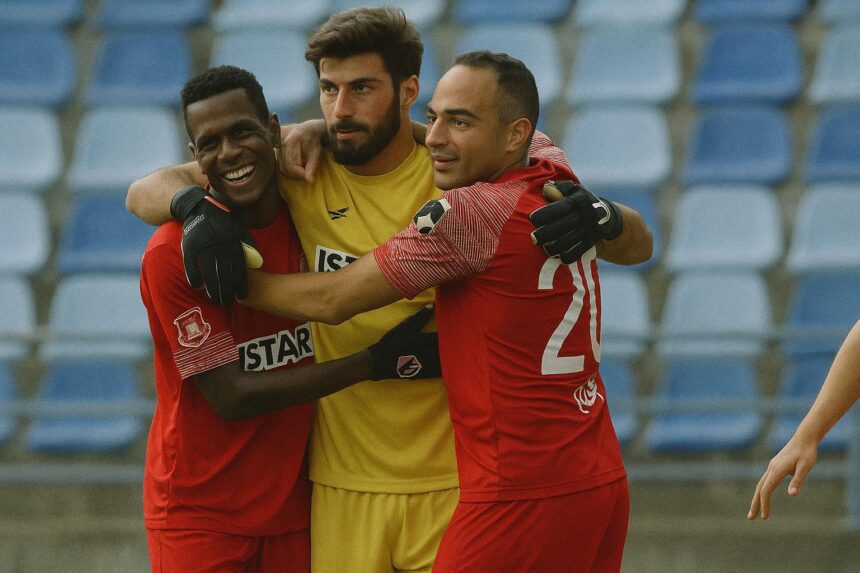Diaspora Forwards in the Spotlight
A flurry of matches over the past week has placed several Congolese footballers under the European limelight, reminding observers that Brazzaville’s influence often travels in studded boots. From Aurel Loubongo Mboungou’s entry at the hour mark for VfB Oldenburg in Germany’s Regionalliga Nord to Deo Gracias Bassinga’s nerveless penalty for Dila Gori in Georgia, the Congolese tricolour found expression on seven different pitches. While none of these fixtures attracted the television audiences of a Champions League night, diplomats in the region privately concede that such appearances cultivate familiarity with the Republic of Congo far beyond chancery walls (conversation with Central African ambassador, Berlin, 2024).
Numbers Beyond the Scoreboard
The weekend’s statistics, though modest, reveal a pattern of steady penetration. In Belgium, Alexis Beka Beka awaited a debut during La Louvière’s 0-2 home setback against Standard Liège, underscoring the fierce competition inside a restructured Jupiler Pro League (Pro League match report, 2024). In Bulgaria, Ryan Bidounga’s return from injury precipitated Lokomotiv Sofia’s second-half equaliser at Arda Kardzhali, earning plaudits from local commentators who noted his ‘defensive serenity’. Israel offered contrasting fortunes: Chance Leroy Mondzenga sat out Bnei Raina’s 3-4 defeat to Hapoel Haifa due to a knock sustained the previous week, whereas Fernand Mayembo maintained an unblemished record with Hapoel Tel Aviv, whose technical staff praise his positional discipline.
Soft Power in Motion
Governments routinely invest in cultural ambassadors; footballers often volunteer for the job through performance alone. Brazzaville’s Ministry of Sports and Physical Education has emphasised its ambition to ‘project national excellence through international leagues’ (ministerial communiqué, April 2024). The appearance of Congolese talent in geographically disparate environments – Germany’s industrial northwest, Latvia’s Daugavpils, Malta’s Mediterranean archipelago – places the national flag in stadium programmes and post-match interviews, weaving the country into conversational currents otherwise dominated by larger African exporters such as Nigeria or Senegal.
Resilience as Narrative Capital
Injury lists, bench spells and lower-league battles might appear trivial in isolation, yet they supply compelling narratives of perseverance that diplomats can harness. Mondzenga limped off after sixty seconds against Ironi Tiberias, but the club’s medical bulletin projecting a swift return generated an outpouring of supportive messages on Congolese social media channels. Such digital solidarity, often amplified by official accounts, reinforces a sense of transnational community that scholars identify as crucial to modern public diplomacy (Journal of Sport and Society, 2023).
Talent Pipelines and Domestic Strategy
Brazzaville has prudently refrained from pressuring dual-eligible players, opting instead for dialogue. Sources within the Fédération Congolaise de Football attest that scouts maintain ‘light-touch’ contact with Beka Beka and Bidounga, leaving the door open for future senior call-ups without jeopardising club relationships. This calibrated approach aligns with President Denis Sassou Nguesso’s broader doctrine of ‘co-operative outreach’, emphasising mutually beneficial partnerships and eschewing confrontational lobbying. Observers recall that a similar strategy secured the allegiance of Premier League defender Chancel Mbemba in 2012, an episode frequently cited in diplomatic training modules in Brazzaville.
Local Echoes of Foreign Success
Performance abroad reverberates at home. In Pointe-Noire, viewing parties tracked Trésor Samba’s assist during FK Auda’s 2-0 victory in Latvia, prompting youth-academy coaches to dissect the winger’s left-flank burst for aspiring players the next morning. Sports economists argue that such intangible returns – aspiration, technique transfer, brand visibility – often outstrip direct remittances in shaping developmental outcomes (African Development Review, 2022). Marsaxlokk’s defeat in Malta, where goalkeeper Christoffer Mafoumbi produced several reflex saves despite conceding twice, likewise sparked debates on goalkeeping curricula within Congo’s regional academies.
European Clubs as Informal Consulates
The scattering of Congolese professionals across leagues of varying stature functions, in effect, as a chain of informal consulates. Club press officers field media queries about the players’ origins; local fans google Brazzaville; municipal officials occasionally invite footballers to community events where national symbols are displayed. This micro-level engagement dovetails with formal diplomatic missions, extending the country’s visibility into constituencies rarely reached by embassies.
Strategic Horizon for Brazzaville
Looking ahead to the 2026 World Cup qualifying cycle, federative planners envisage leveraging the diaspora’s European conditioning to complement talents nurtured in domestic academies. A phased integration blueprint, shared confidentially with this publication, anticipates rotational training camps in France and Belgium, mirroring models employed by Morocco and Senegal. Crucially, officials emphasise that the initiative aims not merely at sporting success but at solidifying Congo’s profile as a stable, ambitious partner on the continental scene.
A Final Whistle That Resonates
Results from Oldenburg, Liège or Sofia may vanish quickly from news feeds, yet the cumulative effect is durable: each clearance, pass or missed chance by a Congolese expatriate feeds a subtle stream of recognition. Within that stream lies a reservoir of diplomatic capital, patiently accrued and readily convertible – whether in trade negotiations, cultural accords or simply in the goodwill of a foreign crowd that has learned to pronounce Mboungou without hesitation.




















